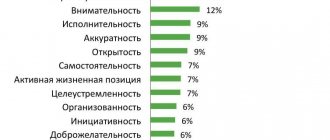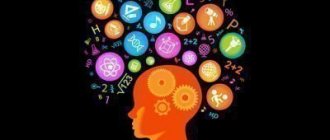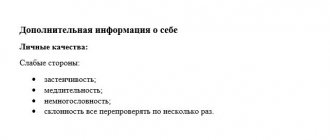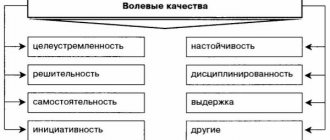Examples of professional qualities in a resume
When writing your resume, you should pay special attention to your professional qualities. It is by them that the employer will judge whether you are suitable for the company or not. Accordingly, professional qualities for a resume need to be selected and listed very carefully in order to attract the recruiter who will communicate with you at the interview.
Content
- Professional qualities for a resume
- Examples of professional qualities in a resume
Professional qualities for a resume
Professional qualities - this is how one can characterize the totality of personal qualities, as well as all the skills that a person managed to acquire during his professional activity. They can help you improve in the future and bring tangible benefits to your company.
Sometimes there are qualities that can be called professional only conditionally. For example, if an applicant describes a “developed sense of humor” as one of them, they are unlikely to attract the recruiter’s attention. Unless a person is looking for a job as a party host - then the sense of humor can still be called professional.
How to get an effective resume with a favorable description of your professional qualities?
We offer professional assistance to job seekers who want to take their job search seriously and get quality results.
We recommend ordering a resume writing service in Russian or English. Our specialists will help you create a truly competitive resume with the right accents.
Strong professional qualities for a resume
- desire for professional growth;
- ability to persuade;
- increased performance;
- analytical thinking.
All this will allow the recruiter to get his bearings and understand how to communicate with you and what qualities of yours to best try to reveal during an interview.
For example, the same lack of experience can be complemented by such qualities as result orientation and quick learning. Thus, the employer, realizing that one cannot expect instant results from a new employee, still gets the opportunity to create from him exactly the kind of specialist that is required. If your future employer is forward-thinking, you have a good chance.
Examples of professional qualities in a resume
It must be remembered that when listing any of the professional qualities, you need to coordinate this list with the requirements for the position. For example, accuracy can hardly be considered a professional quality and defining criteria for a candidate applying for a top manager position. But it can turn out to be a very tangible advantage for the position of secretary. Therefore, when choosing professional qualities for your resume, consider how relevant one or another of them will be for you in a future position.
Here are a few situations related to certain professions that require certain specific qualities.
Example of professional qualities for a manager's resume
- responsibility;
- performance;
- ability to negotiate;
- enterprise;
- ability to make quick decisions.
Example of professional qualities for an accountant resume
- diligence;
- accuracy;
- punctuality;
- organization.
Example of professional qualities for a sales manager resume
- the ability to find a common language with people;
- public speaking skills;
- ability to quickly navigate a situation;
- creativity.
As you can see, the difference in professional qualities is obvious. It all depends on what vacancy you intend to apply for. But do not forget that the list of qualities should not be too long. If it contains about 10 points (or even more), then there is a high probability that your resume will be put aside: after all, the recruiter will get the feeling that you are simply praising yourself. Show moderation and the recruiter will appreciate your professional qualities in your resume.
Assessment of negative qualities
There are several ways to present your negative sides. You can talk about a weakness that you managed to correct. This will demonstrate the applicant as a purposeful person with willpower. This will show that the person is ready to develop and change if necessary. In this context, you can write about the following skills:
- unpunctual, but after appropriate courses he acquired time management skills;
- has a fear of speaking in public, but is now learning the basics of public speaking;
- slow, but does the work efficiently and on time;
- poorly versed in technical innovations, but if necessary, monitors relevant resources with up-to-date information, etc.
You can write about personal or professional qualities that do not relate to the chosen type of activity. They will not in any way affect the quality of work or productivity of a potential employee.
The third popular option is to present your skills and qualities in a favorable light. With their help, you need to convince the employer that the applicant is an ideal candidate for the vacant position. Show that they will not interfere with work. For someone applying for a leadership position, this may be a desire to control all processes in the company.
List of other negative qualities that you can write about:
- hyperactivity;
- excessive emotionality;
- inability to lie;
- healthy selfishness;
- self-confidence;
- straightforwardness;
- modesty;
- poor communication skills;
- touchiness;
- greed, etc.
Newcomers should immediately warn their employer about their lack of experience. This will be their key negative business characteristic. They can indicate as negative qualities hard work, straightforwardness, restlessness, excessive activity, etc.
list of professional and personal qualities of an employee (video)
October 28, 2015
What might an employee’s business qualities be, a list that should be followed? The list of them is of course large and varied. Currently, it is up to the employer to evaluate the actions of any employee, his level of professionalism, strengths and business qualities. This becomes a perfect task, helping to form an efficient team and significantly increase labor efficiency. But from the side of the employee himself, their list helps not only to create a competent resume sent when looking for a job, but also increases the chances of other potential applicants in the employment process.
The personal qualities of employees can be divided into 2 large categories: personal, which are initially innate and develop during the development stages of the person himself, and professional, which are acquired in the process of work and come with experience. A skillful combination of both, and constant work on oneself, provide a unique opportunity for career growth and good management. Let's look at these categories in more detail.
Professional qualities of the employee
Of course, in its standard understanding, this list can be huge, and the criteria that a manager uses when assessing a particular employee can differ significantly depending on the positions held, the functionality assigned to the employees, and the tasks assigned to them.
But let’s try to collect their frequently occurring positions into a single list.
- Self confidence. This is an acquired quality that gives a clear awareness of the impeccable performance of one’s functions and a kind of basis for further decision-making.
- Excellent knowledge of the features and technology of work, ways to improve it. It is developed with incoming experience and thanks to one’s own interest in the relevance of production changes.
- The ability to choose the right means and real methods for achieving the best results.
- Creativity. Defining an updated approach to an established production process and the opportunity to look at it from a different, non-standard perspective.
- Stress resistance. This is the ability to show restraint in one’s own reaction in relation to the situation or actions of employees.
- Planning your own work process in relation to efficiency and combining it with the work of the entire team.
- Emotional balance. Lack of a strong reaction to what is happening and regular maintenance of calm in conflict issues. It is developed over time in the stability of emerging situations.
- The desire to win. Regular desire to achieve the best performance in relation to other employees occupying the same positions in the organization.
- Distribution of powers and responsibilities. The ability to determine the priority of assigned tasks and delegate some powers to the team with their subsequent control.
- Clear and tough solutions to operational issues. In the process of well-established work, non-standard situations arise that require timely identification and resolution, and here only actual actions are necessary.
- Strictness and fairness towards one’s own actions and those of others. Abilities that enable you to evaluate work results.
- Organization of personnel work. The ability to professionally organize the process of activity so that each employee clearly understands their tasks and strives for their effective implementation.
Personal qualities of employees
These are aspects of human life that are formed individually, developing every year. They affect not only relationships in the family, everyday life and friendly contacts, but also work processes.
- Skill to work in team. Of course, this is very important when the team, as a whole, is determined to achieve results, to organize its work without conflicts and in a pleasant positive way with the rest of the employees.
- Justice and honesty. This is the key to the right attitude and the opportunity to demand the same attitude towards yourself.
- The ability to listen to other people’s opinions, accept advice and recommendations. You need to understand that the decision made may not always be the only true and correct one, and an outside perspective is sometimes able to most effectively assess the situation. It is important to simply accept such help.
- Adequate perception of criticism from outside. Do not think that the criticizing person is completely negative towards you. Perhaps this is simply a method to show real performance results and improve their level. Such criticism mostly brings positive results.
- Ability to defend your decisions and interests. In industrial disputes, based on evidence and facts, it is important to correctly convey performance indicators
- Integrity. This is a quality that helps you defend your own point of view.
- The ability to keep your word. This position convinces of responsibility and the opportunity to rely on your candidacy, confirming once again that you are a good employee.
- Showing tact. This is the ability with which it is possible to build better relationships in a team.
- Determination and perseverance. Such innate qualities allow you to defend your own position and convince management of the correctness of your decisions.
The assessment of the business qualities of employees for the first time occurs when hiring. It is here, during the interview process, that the head of the organization considers your candidacy positionally, mentally applying these qualities in relation to the future functionality of the job. And a little later, by conducting regular certifications, it helps to assess the suitability of abilities for the position held. During the assessment process, a number of other main tasks are solved:
- the most relevant place in the organizational structure is determined for more effective use of the strengths of the future employee;
- if necessary, develops an individual development program for employees;
- ways of possible motivation are determined;
- The satisfaction of personnel from their duties is considered.
On the one hand, such a process helps to actively collect all the necessary information to study the employee’s level of professionalism and the possible organization of his training, and on the other hand, it increases his motivation and develops the basis for future material incentives.
There are several stages of business assessment of personnel:
- collection of preliminary information about the activities and results of an employee’s labor in production;
- drawing up basic questions for an assessment conversation with an employee;
- conducting an interview and evaluating the responses received to the assessment questions asked;
- formation of an expert-level opinion and transfer of data to a special commission;
- making individual decisions on proposals put forward.
The business qualities of employees, and the ability to effectively evaluate them, help to set up the work process of the entire team, establish a comfortable environment and, most importantly, significantly increase the production indicators of not only the department, but also the organization as a whole.
Important characteristics for different types of professions
A professionally written resume is immediately noticeable. It describes only those qualities that relate to the vacant position. Meeting the recruiter's expectations and needs increases the chance that a person will be considered.
Comparison of business qualities, personality traits and professions:
- Leadership positions. Such employees value their ability to work in a team, correctly distribute responsibilities, quickly adapt to new conditions, and bear responsibility for the work of subordinates. Tolerance, loyalty, logical thinking, planning and analytical abilities, ethics, and honesty are also important.
- Technical specialists, lawyers, economists. They must be able to work with documentation, notice details, collect and analyze data. They must be pedantic, attentive, assiduous, far-sighted, and careful.
- Professions that involve communicating with people. The main thing is communication skills and the ability to find an approach to different categories of people. Other professionally significant characteristics: politeness, ethics, collectivism, efficiency, sociability, easy adaptation, decency.
The candidate's professional abilities are assessed in several ways. These are letters of recommendation, testing, an exam on knowledge of the specifics of the chosen type of activity, role-playing games, and cases. But the first stage is an interview, at which they may ask:
- what are your strengths;
- how would you characterize your weaknesses;
- why we should consider your candidacy;
- what do you want to achieve in our company, etc.
During the interview, the employer wants to check the applicant for honesty and compare the described qualities with the real ones. Role-playing games will help show how a person reacts to stressful situations.
Professional qualities for a resume
Professional qualities - this is how one can characterize the totality of personal qualities, as well as all the skills that a person managed to acquire during his professional activity. They can help you improve in the future and bring tangible benefits to your company.
Sometimes there are qualities that can be called professional only conditionally. For example, if an applicant describes a “developed sense of humor” as one of them, they are unlikely to attract the recruiter’s attention. Unless a person is looking for a job as a party host - then the sense of humor can still be called professional.
Strong professional qualities for a resume
- desire for professional growth;
- ability to persuade;
- increased performance;
- analytical thinking.
All this will allow the recruiter to get his bearings and understand how to communicate with you and what qualities of yours to best try to reveal during an interview.
For example, the same lack of experience can be complemented by such qualities as result orientation and quick learning. Thus, the employer, realizing that one cannot expect instant results from a new employee, still gets the opportunity to create from him exactly the kind of specialist that is required. If your future employer is forward-thinking, you have a good chance.
Selection of characteristics
HR specialists advise writing no more than 5-7 personal and professional qualities. This number is enough to evaluate the applicant.
If there are 5 qualities, this will demonstrate that the candidate knows how to set priorities, choose the main thing and is able to make an intelligent choice.
It is imperative to select qualities that characterize a person’s strengths and weaknesses.
You need to evaluate yourself adequately, without the influence of low or high self-esteem. You can write down all your strengths and weaknesses on a sheet and choose those that not only successfully characterize the person, but also directly relate to the vacancy.
It's better not to use standard descriptions. Banal characteristics that are written on every resume will not attract an employer. A great solution is to describe the qualities in a few words.
At the interview, you may be asked to provide examples that confirm the presence of the specified personal and professional abilities.
Examples of professional qualities in a resume
It must be remembered that when listing any of the professional qualities, you need to coordinate this list with the requirements for the position. For example, accuracy can hardly be considered a professional quality and defining criteria for a candidate applying for a top manager position. But it can turn out to be a very tangible advantage for the position of secretary. Therefore, when choosing professional qualities for your resume, consider how relevant one or another of them will be for you in a future position.
Here are a few situations related to certain professions that require certain specific qualities.
Example of professional qualities for a manager's resume
- responsibility;
- performance;
- ability to negotiate;
- enterprise;
- ability to make quick decisions.
Example of professional qualities for an accountant resume
- diligence;
- accuracy;
- punctuality;
- organization.
Example of professional qualities for a sales manager resume
- the ability to find a common language with people;
- public speaking skills;
- ability to quickly navigate a situation;
- creativity.
As you can see, the difference in professional qualities is obvious. It all depends on what vacancy you intend to apply for. But do not forget that the list of qualities should not be too long. If it contains about 10 points (or even more), then there is a high probability that your resume will be put aside: after all, the recruiter will get the feeling that you are simply praising yourself. Show moderation and the recruiter will appreciate your professional qualities in your resume.
Personal qualities
What other qualities should a specialist have, personal qualities in a resume:
- Knowledge and experience in using technologies used during work.
- Clear and prompt resolution of complex issues and tasks. Ability to quickly move on to another task after completing the first.
- Be careful when working with important documents.
- Responsiveness when receiving requests and suggestions.
- Ability to independently motivate and control yourself.
- Focus on qualitative rather than quantitative results.
- Good speech and presentable appearance. Punctuality.
- Communication skills, ability to work in a group and distribute assigned tasks among a number of people.
- Quick adaptation to various changes. Rational use of provided resources.
- Self-criticism and the ability to listen to criticism and the opinions of others.
You should not write your resume using templates. There are many letters filled with similar texts.
Unusual works, filled not only with typical professional qualities for a resume, but also with interesting nuances, will be worthy of attention.
Small video recommendations on writing a resume and passing interviews
How to write a resume for a job
How to pass a job interview
You may also be interested
What negative qualities can be indicated in a resume: instructions and examples for applicants.
What personal qualities to include in a resume: universal rules and examples for applicants.
The correct resume form for applying for a job in English: download in WORD or PDF.
What positive personal qualities to include in your resume: recommendations and examples for applicants.
The correct resume form for applying for a job in Russian: download in WORD or PDF.
How to find out an employee's strengths?
To save time, the employer uses the following methods to evaluate a potential employee:
- Letters of recommendation from previous employers. Due to strict selection criteria, requests for recommendations are practiced in Western countries.
- Tests. It would also be a good idea for an employee to take a test to determine his suitability for his chosen profession. Employers often use such tests.
- Interview. During a personal conversation, it is assessed how socially adapted the specialist is.
- Examination of specific employee skills. Knowledge of the law for lawyers, understanding of algorithms for programmers.
- Role-playing game. In sales, it is often practiced to initiate cold calls or directly contact the buyer. It is proposed to sell a telephone or, as employers have long used it, a pen on the spot.
Natural behavior endears you to a potential employer
Professional qualities for writing a successful resume
Today, to get a job, you just need to send your resume by email. The part where the professional qualities of the individual will be specified is one of the most important for the employer; thanks to the list of characteristics, you can learn a lot about a person without communicating with him.
An employer will understand a lot about a person by reading a list of his professional qualities
Professionally significant personality traits of a teacher article
Professionally significant personality traits of a teacher
Prepared by: Shilovsky Alexander Sergeevich,
physical education teacher GBOU secondary school No. 356
Moskovsky district of St. Petersburg
In modern conditions in Russian society, the need for competent specialists in a variety of areas of professional activity is constantly growing. Modern society needs teachers capable of successful professional activities.
Historically, each theory of teaching and upbringing puts forward its own requirements for the personality and activities of a teacher. The current turning point in the development of domestic education has caused a change in value orientations. The formation and development of a new understanding of the personality of a teacher is one of the most actively discussed problems in the scientific and educational community.
Society trusts the teacher with the most valuable thing - its children, who are its future. The formation of the personality and professionalism of his students, and, consequently, the development of society as a whole depends on the qualities of the teacher. Thus, for the modern stage of education, it is important not so much to transfer a certain amount of knowledge, but to develop the desire and ability to acquire this knowledge and use it independently. In the process of educational and professional activities, a teacher needs to reveal a person’s potential, create motivation for success, independence, which places very high demands on the personality and professional activities of a teacher, teacher, lecturer.
The strategy of modern teacher education is the development and self-development of the personality of a teacher who is able to freely navigate complex sociocultural circumstances and act responsibly and professionally in solving current educational problems. This strategy is embodied in the focus of the content, forms and methods of the educational process on the formation of a spiritually developed, cultural personality of a teacher who has a holistic humanistic worldview, deep professional knowledge, and comprehensively realizes his creative potential in professional activities.
When modeling the personality of a teacher, it is necessary to overcome the existing gap between the teacher and the person, the citizen and the specialist. The personal position of the future teacher should become an organic part of his professional activity. The formation and development of this internally integral unity must occur in a single process.
The ongoing changes in the domestic education system have raised a number of controversial questions regarding the attitude towards these reforms, their assessment, as well as the problems of forming and developing the professional competence of a teacher. Contradictions have arisen between society's need for an individual who is self-confident and makes responsible choices, and the traditional system of education, between the declared idea of humanizing education and the insufficient knowledge of pedagogical conditions that contribute to the formation of humanistic principles. Not enough attention is paid to the education of the emotional sphere of consciousness of future specialist teachers.
It is very important to understand whether teachers can correctly respond to these changes, that is, correctly determine and change their positions as a subject of the educational process, and conduct innovative activities for the purposeful development of students’ personalities.
Thus, there is a need to understand the place and role of the teacher in education, his personal characteristics and professional qualities at the stage of modern development of society.
A modern teacher will be able to fully realize his professional potential depending on the depth of understanding of the essence of education. For this understanding, it is necessary to develop and form pedagogical abilities, which are characterized by a combination of mental and emotionally-volitional qualities of the individual.
1. Gnostic (the ability to quickly and creatively master teaching methods, create and look for new ways; self-improvement; professional growth; the ability to use educational and additional literature; highlighting significant connections between previously studied and new knowledge; forming the purpose of an educational lesson as a result of students’ educational activities and as a procedural characteristic of a teacher’s activity; studying the quality of work performed and analyzing one’s own reasons for success and failure in the educational process);
2. Constructive (the ability to create an atmosphere of cooperation, joint activity, sensitivity to the construction of a lesson for the purpose of development and self-development of the student, the establishment of pedagogically appropriate relationships with him; knowledge of the characteristics of each type of form of educational organization; the ability to choose the appropriate structure of the educational lesson depending on the state of processing curriculum of the subject and purpose of the lesson);
3. Perceptual (the teacher’s ability to penetrate into the inner world of students, psychological observation, understanding of the student’s personality and his mental states);
4. Communicative (ability to communicate with students, the ability to find the right approach to them; establish pedagogically appropriate relationships with them; the presence of pedagogical tact);
5. Organizational (the ability to organize a student class, unite it, optimize one’s own activities; organization and self-organization);
6. Suggestive (qualities expressed through an emotional and volitional influence on students, the ability to persuade, determination, and the formation of the volitional sphere);
7. Projective (qualities that manifest themselves in predictable results of actions, in the educational design of students’ personalities; the ability to predict the development of their qualities; pedagogical optimism, faith in the child);
8. Creative (creative skills).
Professional needs include: the need to communicate with students and their parents; in mastering pedagogical and psychological knowledge, skills and abilities; in replenishing your knowledge; in the aesthetic design of life.
Traits associated with civic and professional orientation include: patriotism, love for children, humanism, integrity, collectivism, professional innovation and efficiency, sociability.
Intellectual qualities are general erudition, pedagogical attentiveness and observation, good memory, quick wit, depth and originality of mind, development of speech, sense of humor.
In the system of professional knowledge of a teacher, five main blocks can be distinguished:
The first block is clear ideas about a specific mental reality, associated with an insatiable interest in it and a willingness to contact it in interpersonal communication.
The following psychological components are distinguished: differential psychological - this is knowledge about the peculiarities of mastering educational material in accordance with individual and age characteristics; socio-psychological - this is knowledge about the characteristics of educational, cognitive and communicative activities of the study group and a specific individual in it, about the characteristics of relationships; autopsychological is knowledge about the positive and negative aspects of one’s activity, its features.
The second block is pedagogical knowledge. There is such a feature of pedagogical activity as multi-levelness. Among them are knowledge of the conditionality of learning goals, theoretical (knowledge of the laws and principles of pedagogical activity), methodological (formation of the educational process), technological (the level of solving practical problems of training and education in specific conditions).
The third block is a set of knowledge that the teacher possesses and with the help of which he has an idea of the characteristics of various specialties, the current state and conditions of development, the relevance of the profession, the system of training personnel in production and specialists in each of the specialties.
The fourth block includes subject knowledge, according to which the specialist knows the theoretical foundations and sees the basis of his specialty.
The fifth block is research knowledge. This knowledge stimulates interest in studying other specialties, forms theoretical and practical skills, and expands the scientific worldview.
Diagnostics of factors in the development of professionally significant qualities of teachers
The teacher’s skills are directly related to his work, where the teacher’s talent, intuition and inspiration play a big role. One of the conditions for the growth of professional qualities is creative pedagogical activity, based on its constant improvement.
The following factors are of great importance for the development of mastery: the immediate environment in which the teacher finds himself; microclimate of the team in which he works; traditions and ideas by which he lives. The most precise definition of this concept is described in the pedagogical encyclopedia.
Pedagogical skill is the art of teaching and upbringing, which should always be improved and be accessible to every teacher who loves children and works according to his calling. This definition characterizes the quality of teaching activity.
The definitions highlight a total of four relatively independent, but interconnected blocks in the structure of pedagogical skills:
- professional and pedagogical knowledge;
- personal and professionally important qualities;
- teaching abilities;
- skills and ability to build the educational process, the art of carrying out pedagogical activities.
As you know, to be a professional, you need to constantly develop, which means that a teacher must constantly engage in self-education and self-development.
The process of forming and developing a teacher’s skill allows one to predict, learn and transform activities, improve one’s professional qualities throughout one’s life, mobilizing the knowledge acquired by the teacher and developing the ability to look for new tasks that arise, make informed professional decisions, and form the subjective position of the student.
In the process of developing pedagogical skills, the reserves of a teacher’s personal development and the possibility of optimizing his pedagogical impact are revealed, which allows him to respond to the “challenge” of the educational environment.
One of the important areas for improving and developing pedagogical skills is teacher self-education. The self-development of each teacher is built taking into account the individual characteristics of intellectual activity and knowledge of mental work techniques
A teacher’s self-education depends on his ability to organize his personal time, draw up a personal plan for self-education and implement it. It is an independent cognitive activity that requires targeted self-development from a person - the development of mental properties and qualities, organizational, intellectual skills. After all, only on this path is professional and personal growth possible.
Thus, the development of a teacher’s professional qualities proceeds in two directions, which are closely related to each other:
1. Development of professional qualities that are guided externally:
- organization of methodological associations at school;
- refresher courses.
2. Development of professional qualities, which are guided from within, by the teacher himself:
- self-education (acquisition of knowledge, skills and abilities);
- self-education (formation of experience, motives of activity, worldview and personality traits);
- self-development (improving abilities and mental processes).
Self-education of a teacher ensures an increase in the level of his professional qualities, and as a result - continuous self-development and its influence on the development of the student.
The self-educational activity of a teacher is the key to the successful operation of each educational institution, which confirms that the level of development of a teacher’s professional qualities depends on self-education and improving pedagogical skills.
LITERATURE
- Babansky, Yu. K. Teaching methods in modern secondary schools. [Text] /Yu.K. BabanskyM: Enlightenment, 1985.
- Zyazyun, I. A Fundamentals of pedagogical skills [Text] / I.A. Zazyun – M: Education, 1989.
- Kuzmina, N.V. Methods of systemic pedagogical research [Text] / N.V. Kuzmina. - M.: Public Education, 2002. - 208 p.
- Pedagogy of vocational education: Textbook for students of higher education. educational institutions [Text]/E.P. Belozertsev, A.D. Goneev, A.G. Pashkov and others; Ed. V.A. Slastenina. – M.: Publishing House, 2011. – 368 p.
- Selevko, G.K. Modern educational technologies [Text] / G.K. Selevko. - M.: Nar. education, 2000. - 256 p.
- Simonenko N.N. Management of educational services using innovative teaching methods // Bulletin of the Pacific State University. - 2012. - No. 2. - P. 201-206.
- Spirin, L.F. Theory and technology for solving pedagogical problems (developing professional pedagogical training and self-education) / L.F. Spirin M: Russian Pedagogical Agency, 1997
- Federov V.A. Pedagogical technologies for quality management of vocational education [Text]/ V.A. Fedorov. – M.: Publishing House, 2010. – 208 p.
- Shiyanov, E.N. Humanistic pedagogy of Russia: formation and development / E.N. Shiyanov, N.B. Romaeva. - M.: National education, 2003. - 336 p.
How to present yourself correctly
When compiling a list of qualities of an employee of an organization, it is necessary to list and explain:
- Personal qualities of a person. These are the characteristics that appeared during his socialization.
- Business qualities of the employee. These are the characteristics that describe a person as a potential specialist.
- Key skills. You need to point out the skills acquired at school, university or while working in another company that will help you cope with tasks in a new place.
When compiling this list, there is no need to deviate from the main goal of the resume - further employment in a prestigious organization. You should not list those personal qualities that you do not possess. The deception will be revealed quickly, but the feeling of shame will remain for a long time.
Professional and personal: the difference
Job seekers often confuse professional skills and personal qualities. There is a very fine line between the two concepts. Business qualities characterize a person as a workforce. The most important are the level of education and work experience. Both factors will help the employer assess possible labor productivity, competence, and professional skills.
When considering business qualities, it is important for the recruiter to understand whether the applicant will be suitable for the vacant position. He analyzes whether the candidate will help achieve the desired goals, what value he brings to the company and what his salary may be.
Features of personal qualities indicated in the resume:
- characterize a person as a person;
- taken into account when several candidates have business skills at the same level;
- help in forming an opinion about the candidate’s attitude towards work, colleagues, superiors, etc.
Personal characteristics are secondary and are not always taken into account, but they still need to be written about carefully.
Important: what factors influence the choice of profession?
What to write about in your resume
Many people think that a cheerful person will join the team faster. A good sense of humor can help with informal communication with colleagues, but such a characteristic will not give the desired result unless you are applying for a job as a toastmaster or animator. What professionally important personality qualities should be indicated in a resume:
- If you want to emphasize that you are ready to work hard, then it is worth pointing out the desire to develop, the presence of increased efficiency, the desire for career growth, and resistance to stress.
- If you want to indicate the presence of leadership potential, then the following phrases will help: the ability to distribute powers and responsibilities, responsible, have negotiation skills, have the ability to quickly navigate a situation and get out of it.
- If you are attracted to a position where deep knowledge and good mental abilities are required, then you need to write about entrepreneurship, the ability to quickly solve problems, accuracy, organization, and analytical thinking.
- If the vacancy requires frequent public speaking, then it is necessary to declare such useful qualities as emotional balance, the ability to control oneself even in front of a large crowd of people, the ability to find a common language with people, self-confidence, and oratorical abilities.
- If in the process of work you need to show creative abilities, then it won’t hurt to talk about the presence of creative thinking, a non-standard approach to standard things.
Creativity is essential for creative work
General qualification requirements for knowledge and skills
The table provides a list of characteristics that ensure professional and personal growth.
Business characteristics | Personal characteristics |
| Education | Accuracy |
| Level of qualification, specialty | Activity |
| Experience, positions held | Expressed ambitions |
| Labor productivity | Lack of desire for conflict |
| Ability to analyze | Reaction |
| Fast adaptation | Politeness |
| Learning ability | Attentiveness |
| Business communication experience | Discipline |
| Attention to details | Initiative |
| Planning experience | Performance |
| Flexible thinking | Sociability |
| Experience in preparing reports | Maximalism |
| Willingness to complete tasks overtime | Perseverance |
| Oratorical skills | Resourcefulness |
| Literacy | Charm |
| Organizational skills | Organization |
| Mathematical ability | Responsibility |
| Enterprise | Decency |
| Ability to communicate with clients | Dedication |
| Ability to perform team work | Love for work |
| Ability to win people over | Confidence in your strength |
| Ability to persuade | Determination |
| External data | Honesty |
| Diction | Enthusiasm |
| Physical form | Ethical |
Personal characteristics are not inferior to professional knowledge. In some situations, employers pay more attention to them.
Useful tips
- In addition to the typical useful qualities of a real professional, it is worth pointing out characteristics that could replace the lack of something in a potential specialist. If you have no experience in a certain area, then you should point out the ability to grasp everything on the fly and learn quickly.
- Before including this or that characteristic, you should think and soberly evaluate yourself. To confirm or refute the presence of a particular personal quality, you need to give an example of a life situation.
- When writing a resume, you need to rely on those characteristics that are necessary when working in this position. If an employee will be entrusted with managing a team or a project, and he has managerial skills, then you need to focus on this.
Definition
Business qualities are a person’s ability to perform functions if he has a certain level of knowledge, education, work experience and personality characteristics. Without identifying and assessing them, it is difficult to entrust him with the performance of duties and count on their high-quality performance.
There are different approaches to defining business and professional qualities. Some people tend to believe that an employee’s professional qualities are the least important. The most popular position is that professionals reveal in more detail the characteristics of a specialist’s properties. Business skills are universal qualities for different types of work.
Description of personal qualities
Personal qualities play no less important role than business qualities when applying for a job. Personal properties reveal the characteristics of a specialist as a person and show how he interacts with other people.
Some of them are laid down from childhood, formed in the family, the other part develops in society, in school and student groups.
Some personal characteristics can only be discovered during work; positive qualities can and should be developed to achieve professional goals. Professional and personal qualities are important for work. They are reflected in the resume of a candidate for a position, often business ones follow from personal ones.
Given the same professional characteristics, the employer studies a list of personal characteristics. The applicant should strive to show the strengths of his character and personality in his resume so that the manager makes an objective choice.
Characteristic
An approximate list of personal qualities of an employee:
- honesty;
- communication skills;
- responsibility and integrity;
- hard work;
- politeness and tact;
- determination;
- flexibility and ability to accept someone else's point of view;
- self-criticism, the ability to see one’s mistakes and admit them;
- stress resistance.
This list shows positive properties; there are also negative aspects of personality that are easy to identify through the opposites of positive properties. It is difficult to find an ideal employee; everyone has these and other characteristics in different proportions.
Description of business qualities
Business qualities for hiring can be classified on various grounds, including motivation, range of job responsibilities, focus on colleagues, management or contractors, time of acquisition of qualities.
One of the common and broad classifications is the division into positive and negative. They will be considered separately, since in different situations the same property can be good, but in another case turn out to be bad. Also, some job characteristics are important for the boss, while others are important for the average specialist.
Positive
Among them are those that characterize the attitude towards work responsibilities:
- discipline;
- perseverance;
- independence in making individual decisions;
- self-learning;
- accuracy in working with documents;
- ability to plan and distribute your time;
- foresight;
- creativity;
- the ability to clearly formulate your thoughts;
- ability to make quick decisions.
Those that show the nature of relationships with others:
- ability to find a common language with clients;
- knowledge of business etiquette;
- ability to speak in public;
- ability to organize events;
- skill to work in team;
- ability to persuade;
- professional integrity;
- balance, striving for the golden mean.
The list is not exhaustive, but contains a basic set, which, if desired, can be supplemented with some personal qualities of the employee.
Negative
Definitely negative qualities:
- greed;
- quarrelsomeness;
- touchiness;
- envy;
- self-confidence and arrogance;
- arrogance;
- talkativeness and tendency to spread gossip;
- aggressiveness;
- manifestation of laziness;
- vindictiveness.
Some properties can be called negative under certain circumstances:
- hyperactivity;
- modesty;
- straightforwardness;
- emotionality.
Reflection in the resume
When hiring, business and personal characteristics are taken into account first. Without knowing the person, an employer can only choose a suitable candidate based on a resume or interview.
Sometimes the problem arises of which employee qualities are most suitable for a resume. The applicant makes a mistake if he lists them in large numbers without selecting the main ones related to the position. For the manager, this is a signal that he does not know how to isolate the necessary information.
The wording in the resume should be clear, concise, logical, and not inconsistent with the rest of the information. It is desirable that they reflect the strengths of the individual, so that from the text it is possible to trace the connection between business qualities and professional achievements.
Sometimes applicants for a position indicate in their resume not only their best sides, but also their worst. This can have two meanings: it demonstrates the person's honesty and shows his shortsightedness. It is advisable to note your shortcomings at the interview, where they will ask about them. It is important to emphasize the desire to correct your shortcomings.
Qualities for different professions
Each field of activity presupposes the presence of certain business qualities that must be indicated in the requirements for the vacancy; they are important when applying for a job:
- For managers, dedication and responsibility are important;
- an accountant must be scrupulous and persevering;
- the secretary cannot do without accuracy and patience;
- A sales manager must have developed communication skills and be flexible.
Source: https://urazuma.ru/uspekh-i-dengi/delovye-kachestva-rabotnika-1.html











